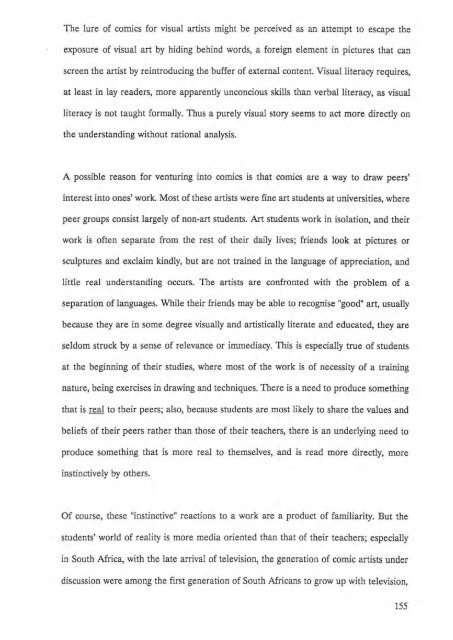Text - Rhodes University
Text - Rhodes University
Text - Rhodes University
You also want an ePaper? Increase the reach of your titles
YUMPU automatically turns print PDFs into web optimized ePapers that Google loves.
The lure of comics for visual artists might be perceived as an attempt to escape the<br />
exposure of visual art by hiding behind words, a foreign element in pictures that can<br />
screen the artist by reintroducing the buffer of external content. Visual literacy requires,<br />
at least in lay readers, more apparently unconcious skills than verbal literacy, as visual<br />
literacy is not taught formally. Thus a purely visual story seems to act more directly on<br />
the understanding without rational analysis.<br />
A possible reason for venturing into comics is that comics are a way to draw peers'<br />
interest into ones' work. Most of these artists were fine art students at universities, where<br />
peer groups consist largely of non-art students. Art students work in isolation, and their<br />
work is often separate from the rest of their daily lives; friends look at pictures or<br />
sculptures and exclaim kindly, but are not trained in the language of appreciation, and<br />
little real understanding occurs. The artists are confronted with the problem of a<br />
separation of languages. While their friends may be able to recognise "good" art, usually<br />
because they are in some degree visually and artistically literate and educated, they are<br />
seldom struck by a sense of relevance or immediacy. This is especially true of students<br />
at the beginning of their studies, where most of the work is of necessity of a training<br />
nature, being exercises in drawing and techniques. There is a need to produce something<br />
that is real to their peers; also, because students are most likely to share the values and<br />
beliefs of their peers rather than those of their teachers, there is an underlying need to<br />
produce something that is more real to themselves, and is read more directly, more<br />
instinctively by others.<br />
Of course, these "instinctive" reactions to a work are a product of familiarity. But the<br />
students' world of reality is more media oriented than that of their teachers; especially<br />
in South Africa, with the late arrival of television, the generation of comic artists under<br />
discussion were among the first generation of South Africans to grow up with television,<br />
155
















